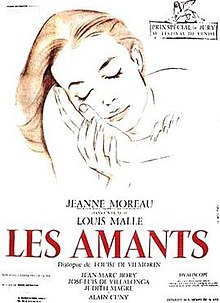Teaming again with Jeanne Moreau, The Lovers (“Les Amants”), a follow-up to “Elevator to the Gallows,” was a “scandalous” movie that, nonetheless, managed to promote the international reputations of both director Louis Malle and star Moreau.
| The Lovers | |
|---|---|

Theatrical release poster
|
|
This feature pushed the boundaries of American censorship, stirring controversy similar to the one that had met Roger Vadim’s And God Created Woman, starring Brigitte Bardot, two years ago.
Based on the novel “Point de Lendemain” by Dominique Vivant, the film centers on an ordinary woman, a humdrum housewife who gets involved in adultery, leading her to the rediscovery of her sexual desire and needs.
The Lovers was Malle’s second feature, made when he was only 25 years old. The film, a box office hit in France when released theatrically, was highly controversial for its depiction of allegedly obscene material when shown in America.
At the 1958 Venice Film Festival, where it world-premiered, the movie won the Special Jury Prize.
Jeanne Tournier (Moreau) lives with her husband Henri (Alain Cuny) of eight years and her child in a mansion near Dijon. Her emotionally cold and detached husband is a career man, a busy newspaper owner with little time for his wife; they often sleep in separate rooms.
Out of boredom, Jeanne escapes to Paris regularly where she can spend time with her suave friend Maggy (Judith Magre) and the polo-playing Raoul (José Luis de Vilallonga), Maggy’s friend and Jeanne’s new lover.
Jeanne’s constant talk of Maggy and Raoul arouses Henri’s curiosity and he demands that Jeanne invite them to dinner.
As it happens, Jeanne’s car breaks down on the day of the dinner party, and she accepts a lift from a younger man named Bernard (Jean-Marc Bory), who drives her home. By the time they get back, Maggy and Raoul had already arrived at the mansion.
Bernard, an archaeologist, is the son of a friend of Jeanne’s husband, and he too is added to the guest list. Jeanne spurns Raoul’s advances, claiming that it is too dangerous, but she does spend time in a boat with Bernard, which is more sensitive and attentive.
In the morning, to the surprise of everyone, Jeanne leaves with Bernard to begin a new life, though neither partner has any idea of what the future will hold for them.
The movie is punctuated by voice-over narration from Jeanne.
Critical Status: The Movie with the Nude Scene
Upon release, The Lovers gained notoriety and was labeled as the “Movie With the Nude Scene.”
By today’s standards, the film is mild–the most suggestive moment shows Moreau’s hand falling on the bed sheets, presumably during intercourse.
Nonetheless, back in 1959, that scene provided fodder for outraged guardians of public morals.
The film led to a court case that was forced to deal with the very the definition of obscenity. A showing of the film in Cleveland Heights, Ohio’s Coventry Village, caused a criminal conviction of the theatre manager for public depiction of obscene material.
He appealed to the U.S. Supreme Court, which reversed the conviction and ruled that the film was not obscene (Jacobellis v. Ohio).
The case resulted in Justice Potter Stewart’s definition of hard-core pornography, which became at once famous and infamous: “I know it when I see it.”
As a result, Stewart did not consider the film to be such.
Credits:
Directed by Louis Malle
Screenplay by Louise de Vilmorin, based on Point de Lendemain
by Dominique Vivant
Cinematography Henri Decaë
Edited by Léonide Azar
Music by Alain Derosnay, Johannes Brahms
Distributed by Lux Compagnie Cinématographique de France
Release date: September 30, 1958 (Venice); November 1958 (France)
Running time: 89 minutes



